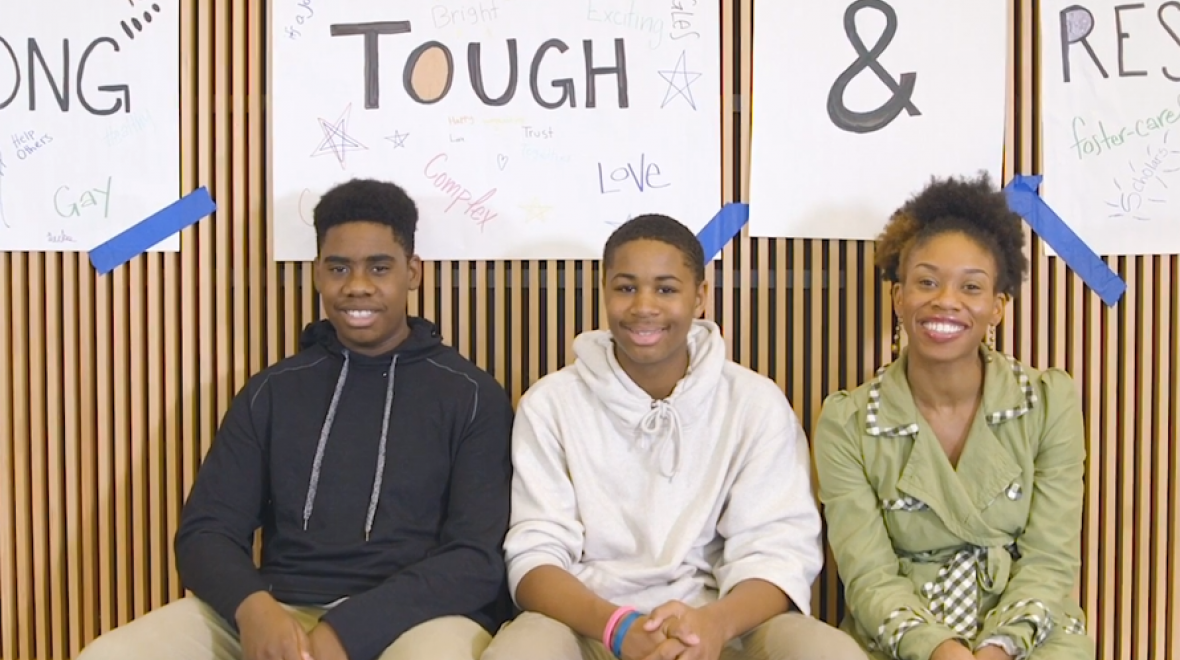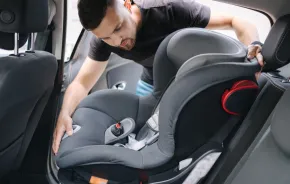
Editor's note: This article was sponsored by the Bill and Melinda Gates Foundation.
When Davon Carroll was in the seventh grade, his dads went to a workshop at Amara, a not-for-profit organization that serves children in foster care. They explained to him that the workshop was a chance for them to get to know other adoptive parents and learn from them. Over the next few months, one thought kept bothering Carroll: Why wasn’t there a group that kids could join to get to know other adopted kids? “I talked with my dads and said, ‘I have this idea,’” Carroll recalls.
After Carroll told his parents about his idea to create a social support group for adopted kids, his dads helped him type up a one-page proposal and they submitted it to Amara. It landed on the desk of Angela Tucker, Amara’s director of post-adoption services. Tucker met with Carroll and his friend, Luke Duncan, who is also transracially adopted, to develop a plan for making the idea a reality. Duncan had attended nearly a dozen summer camps for transracially adopted kids (his mom is president of Harambee Cultural Society, which exists to celebrate the value of transracial families and mitigate the challenges faced by transracially adopted children), and he had a lot of ideas for the program. He recounts his vision: “[It] should be a fun, safe place for people to hang out. How we can make this stronger is to involve a lot of other adoptees.” To bring in more ideas, they held a workshop for interested mentors and teens. The result? The STAR (strong, tough and resilient) mentorship program was born.
The program that emerged didn’t look quite like the boys had imagined it initially. After a mask-making project at the first workshop, STAR shifted from being a casual hangout format to planned activities. “Things evolve,” says Carroll. “When you bring in more people, you get various inputs. But the basic idea, the foundation, is what I wanted.” True to the original concept, STAR is a place where adopted kids can go to be part of a group of other kids like them, have fun and — if they feel like it — talk about adoption.
STAR uses a group-mentorship model that offers youth the chance to connect with both adult mentors (themselves adoptees) and adoptees their own age. One-on-one relationships and adoption-specific conversations are never mandatory. What is required is a yearlong commitment to attend monthly social events planned by the mentors (who are open to suggestions from the kids). While the mentors are off with the kids, parents have the option of hanging out together. The program currently operates in King County (with recruitment in the fall for a yearlong program of group activities) and in Pierce County (with spring recruitment for a group that gets together July–June). Typical group sizes are about 15 youth adoptees and five adult adoptee mentors.
The evolution that Carroll noted continues. Each year, he and Duncan meet with Tucker to plan for the upcoming social support program and look for ways to improve it. They build on successes — both boys cite a field trip to a car show as a high point. “We should do some more trips,” suggests Duncan.
Become a STAR
Parents, adult adoptees and adopted teens who are interested in participating or finding out more about STAR can visit Amara’s website or email postadopt@amaraputskidsfirst.org
Sometimes, the adults are the ones who learn the most. Tucker discovered that many of the mentors still needed the kind of community and support they were trying to provide for the teens. Many of them grew up with no information about their birth families and in environments where no one wanted to talk about adoption. When, for example, a teen in the program would be faced with the choice of spending a day with their birth mother or playing a scheduled soccer game with their teammates, mentors struggled to provide the sort of neutral guidance the teen needed to make a decision. Starting this fall, STAR will evolve to include more training for mentors, and possibly expand to create a new STAR-like support group for adult adoptees.
Now 16 and entering their junior and senior years of high school, respectively, Carroll and Duncan don’t participate in the group activities much anymore. But they continue working with Amara to make STAR helpful and fun for the teens.
Carroll’s inspiration is his little sister. “We’ve always been a package; it’s either both or neither. She likes coming to these events. Just seeing my sister when she comes back so excited and happy [makes me happy]. I had this idea, and it’s paying off,” he says.
Duncan adds, “I never thought of being adopted as a weird thing, but other kids here did, and they left STAR feeling differently.” For him, the best thing about helping create STAR is “knowing that those kids don’t think adoption is bad anymore.”
|
Sponsored by: |
 |











